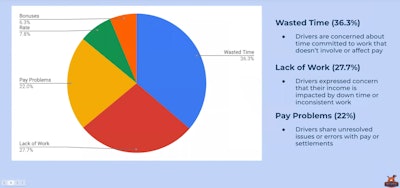With plenty of freight to be hauled and drivers in short supply, American Central Transport (ACT) in Kansas City, Missouri, has learned the value of taking driver feedback seriously when it comes to reinforcing company values centered around driver pay and work-life balance.
To help improve driver satisfaction and thus improve driver retention, ACT, a dry van hauler, has followed up on driver complaints concerning difficult customers.
“We’re in a really good position right now (to address concerns with customers),” ACT President and Chief Operating Officer Phil Wilt said during a WorkHound webinar this week on driver retention. “We’re oversold every day. Now is the time to get things right.
“If we have a customer that's not adhering to the contract, or their treatment of drivers is not acceptable, or they're not turning the freight as fast as it needs to be, all those things are hurting our drivers and, quite honestly, they're hurting us,” Wilt continued. “And so those are the types things that we get to have conversations about. The (driver) feedback is invaluable because this isn't ACT saying this, it’s what our drivers are saying. And I think that customers really are getting how important, how valuable, drivers are.”
 WorkHound CEO and cofounder Max Farrell said driver complaints around compensation are often mistaken by fleets to be concerns with rate of pay. Companies that strive to clear up complexities around pay, he said, will have greater driver satisfaction.WorkHound
WorkHound CEO and cofounder Max Farrell said driver complaints around compensation are often mistaken by fleets to be concerns with rate of pay. Companies that strive to clear up complexities around pay, he said, will have greater driver satisfaction.WorkHound
“We had a lot of drivers stranded in Texas,” Wilt said. “We don't typically pay when an act of God or weather happens. Very few carriers do. We decided to pay those drivers daily pay. Why? Because we felt it was the right thing to do, because we have to make sure that they are staying in good shape with their family. We've got to respect them. We have to have integrity in our programs. We've got to be accountable for them.”









